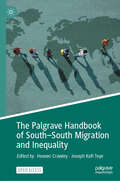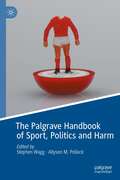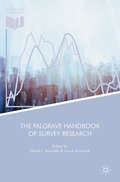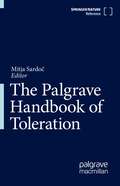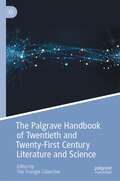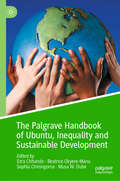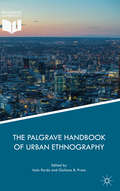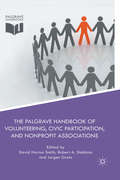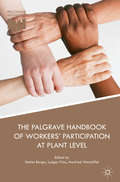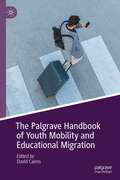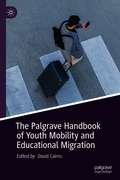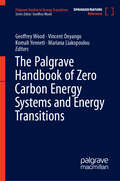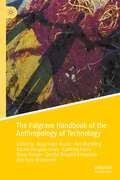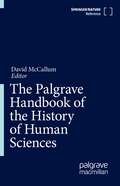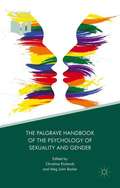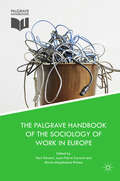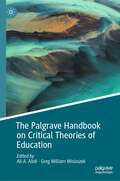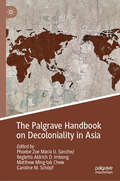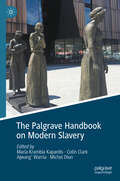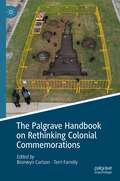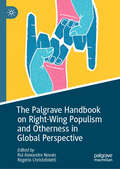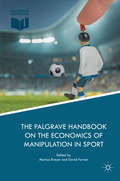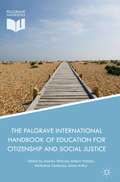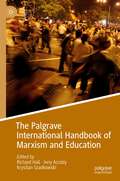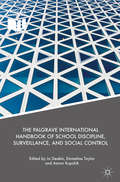- Table View
- List View
The Palgrave Handbook of South–South Migration and Inequality
by Heaven Crawley Joseph Kofi TeyeThis open access handbook examines the phenomenon of South-South migration and its relationship to inequality in the Global South, where at least a third of all international migration takes place. Drawing on contributions from nearly 70 leading migration scholars, mainly from the Global South, the handbook challenges dominant conceptualisations of migration, offering new perspectives and insights that can inform theoretical and policy understandings and unlock migration’s development potential. The handbook is divided into four parts, each highlighting often overlooked mobility patterns within and between regions of the Global South, as well as the inequalities faced by those who move. Key cross-cutting themes include gender, race, poverty and income inequality, migration decision making, intermediaries, remittances, technology, climate change, food security and migration governance. The handbook is an indispensable resource on South-South migration and inequality for academics, researchers, postgraduates and development practitioners.
The Palgrave Handbook of Sport, Politics and Harm
by Stephen Wagg Allyson M. PollockThis book looks historically at the harm that has been inflicted in the practice of sport and at some of the issues, debates and controversies that have arisen as a result. Written by experts in history, sociology, sport journalism and public health, the book considers sport and injury in relation to matters of social class; gender; ethnicity and race; sexuality; political ideology and national identity; health and wellbeing; childhood; animal rights; and popular culture. These matters are, in turn, variously related to a range of sports, including ancient, pre- and early industrial sports; American football; boxing; wrestling and other combat sports; mountaineering; horseracing; cycling; motor racing; rugby football; cricket; association football; baseball; basketball; Crossfit; ice hockey; Olympic sports; Mixed Martial Arts; and sport in an imagined dystopian future.
The Palgrave Handbook of Survey Research
by Jon A. Krosnick David L. VannetteThis handbook is a comprehensive reference guide for researchers, funding agencies and organizations engaged in survey research. Drawing on research from a world-class team of experts, this collection addresses the challenges facing survey-based data collection today as well as the potential opportunities presented by new approaches to survey research, including in the development of policy. It examines innovations in survey methodology and how survey scholars and practitioners should think about survey data in the context of the explosion of new digital sources of data. The Handbook is divided into four key sections: the challenges faced in conventional survey research; opportunities to expand data collection; methods of linking survey data with external sources; and, improving research transparency and data dissemination, with a focus on data curation, evaluating the usability of survey project websites, and the credibility of survey-based social science. Chapter 23 of this book is open access under a CC BY 4. 0 license at link. springer. com.
The Palgrave Handbook of Toleration
by Mitja SardočThe Palgrave Handbook of Toleration aims to provide a comprehensive presentation of toleration as the foundational idea associated with engagement with diversity. This handbook is intended to provide an authoritative exposition of contemporary accounts of toleration, the central justifications used to advance it, a presentation of the different concepts most commonly associated with it (e.g. respect, recognition) as well as the discussion of the many problems dominating the controversies on toleration at both the theoretical or practical level. The Palgrave Handbook of Toleration is aimed as a resource for a global scholarly audience looking for either a detailed presentation of major accounts of toleration, the most important conceptual issues associated with toleration and the many problems dividing either scholars, policy-makers or practitioners.
The Palgrave Handbook of Twentieth and Twenty-First Century Literature and Science (Palgrave Handbooks of Literature and Science)
by Rebecca Walsh Priscilla Wald Gerry Canavan Monique Allewaert Nicholas Gaskill Patrick Jagoda Neel Ahuja Rebecca Evans Aarthi Vadde Britt Rusert Erin Gentry Lamb Jennifer Rhee Erica Fretwell Lindsey Andrews Nihad M. Farooq Matthew A. TaylorThis handbook illustrates the evolution of literature and science, in collaboration and contestation, across the twentieth and twenty-first centuries. The essays it gathers question the charged rhetoric that pits science against the humanities while also demonstrating the ways in which the convergence of literary and scientific approaches strengthens cultural analyses of colonialism, race, sex, labor, state formation, and environmental destruction. The broad scope of this collection explores the shifting relations between literature and science that have shaped our own cultural moment, sometimes in ways that create a problematic hierarchy of knowledge and other times in ways that encourage fruitful interdisciplinary investigations, innovative modes of knowledge production, and politically charged calls for social justice. Across units focused on epistemologies, techniques and methods, ethics and politics, and forms and genres, the chapters address problems ranging across epidemiology and global health, genomics and biotechnology, environmental and energy sciences, behaviorism and psychology, physics, and computational and surveillance technologies.Chapter 19 is available open access under a Creative Commons Attribution 4.0 International License via link.springer.com.
The Palgrave Handbook of Ubuntu, Inequality and Sustainable Development
by Musa W. Dube Ezra Chitando Sophia Chirongoma Beatrice Okyere-ManuThe Palgrave Handbook of Ubuntu, Inequality and Sustainable Development interrogates the multiple inequalities that subsist in the world and explores how Ubuntu, emerging from Africa but being potentially applicable elsewhere, holds promise for mitigation and resolution. It highlights inequalities that relate to gender, climate change, the environment, race, migration, and the struggle against poverty. It reflects on how and the extent to which Ubuntu can be a strategic resource in pursuit of equality and justice.
The Palgrave Handbook of Urban Ethnography
by Italo Pardo Giuliana B. PratoThese ethnographically-based studies of diverse urban experiences across the world present cutting edge research and stimulate an empirically-grounded theoretical reconceptualization. The essays identify ethnography as a powerful tool for making sense of life in our rapidly changing, complex cities. They stress the point that while there is no need to fetishize fieldwork--or to view it as an end in itself --its unique value cannot be overstated. These active, engaged researchers have produced essays that avoid abstractions and generalities while engaging with the analytical complexities of ethnographic evidence. Together, they prove the great value of knowledge produced by long-term fieldwork to mainstream academic debates and, more broadly, to society.
The Palgrave Handbook of Volunteering, Civic Participation, and Nonprofit Associations
by Robert A. Stebbins David Horton Smith Jurgen GrotzWritten by over 200 leading experts from over seventy countries, this handbook provides a comprehensive, state-of-the-art overview of the latest theory and research on volunteering, civic participation and nonprofit membership associations. The first handbook on the subject to be truly multinational and interdisciplinary in its authorship, it represents a major milestone for the discipline. Each chapter follows a rigorous theoretical structure examining definitions, historical background, key analytical issues, usable knowledge, and future trends and required research. The nine parts of the handbook cover the historical and conceptual background of the discipline; special types of volunteering; the major activity areas of volunteering and associations; influences on volunteering and association participation; the internal structures of associations; the internal processes of associations; the external environments of associations; the scope and impacts of volunteering and associations; and conclusions and future prospects. This handbook provides an essential reference work for third-sector research and practice, including a valuable glossary of terms defining over eighty key concepts. Sponsored by the International Council of Voluntarism, Civil Society, and Social Economy Researcher Associations (ICSERA; www.icsera.org), it will appeal to scholars, policymakers and practitioners, and helps to define the emergent academic discipline of voluntaristics.
The Palgrave Handbook of Workers’ Participation at Plant Level
by Ludger Pries Stefan Berger Manfred WannöffelComprising the study, documentation, and comparison of plant-level workers’ participation around the world, this volume meets the challenge of offering a global perspective on workers’ participation, representation, and models of social partnership. Value chains, economic life, inter-cultural exchange and knowledge, as well as the mobility of persons and ideas increasingly cross the borders of nation-states. In the knowledge age, the active participation of workers in organizations is crucially important for sustainable and long-term growth and innovation. This handbook offers lessons from historical, global accounts of workers’ participation at plant level, even as it looks forward to predict forthcoming trends in participation.
The Palgrave Handbook of Youth Mobility and Educational Migration
by David CairnsThis handbook provides an overview of developments in the youth mobility and migration research field, with specific emphasis on movement for education, work and training purposes, encompassing exchanges sponsored by institutions, governments and international agencies, and free movement. The collection features over 30 theoretically and empirically-based discussions of the meaning and key aspects of various forms of mobility as practiced in contemporary societies, and concludes with an exploration of the costs and benefits of moving abroad to individuals and societies at a time when the viability of free circulation is being called into question. The geographical scope of the book covers Europe, Asia, Australia and the Americas, and takes into account socio-economic and regional inequalities, as well as recent developments such as the refugee crisis, Brexit and the Covid-19 pandemic. The book integrates the fields of youth mobility and migration studies, creating opportunities for the establishment of a new paradigm for understanding the spatial circulation of youth and young adults in the twenty-first century.
The Palgrave Handbook of Youth Mobility and Educational Migration
by David CairnsThis handbook provides an overview of developments in the youth mobility and migration research field, with specific emphasis on movement for education, work and training purposes, encompassing exchanges sponsored by institutions, governments and international agencies, and free movement.The collection features over 30 theoretically and empirically-based discussions of the meaning and key aspects of various forms of mobility as practiced in contemporary societies, and concludes with an exploration of the costs and benefits of moving abroad to individuals and societies at a time when the viability of free circulation is being called into question. The geographical scope of the book covers Europe, Asia, Australia and the Americas, and takes into account socio-economic and regional inequalities, as well as recent developments such as the refugee crisis, Brexit and the Covid-19 pandemic. The book integrates the fields of youth mobility and migration studies, creating opportunities for the establishment of a new paradigm for understanding the spatial circulation of youth and young adults in the twenty-first century.
The Palgrave Handbook of Zero Carbon Energy Systems and Energy Transitions (Palgrave Studies in Energy Transitions)
by Geoffrey Wood Vincent Onyango Komali Yenneti Mariana LiakopoulouThe Palgrave Handbook of Zero-Carbon Energy Systems and Energy Transitions provides a comprehensive and authoritative source of information, analysis and recommendations on the multi- and inter-disciplinary subject of zero carbon energy systems. The Handbook will advance thinking and research underlying the on-going energy transition by; covering a wide range of energy technologies and sources (e.g. fossil fuels, renewables, low carbon energy) including investigating the potential of new and alternative technologies and fuel sources and looking at the power, heating/cooling and transport sectors; Looking at varied legal jurisdictions and governance approaches including developing and developed countries and investigating potential new approaches to achieving a zero carbon energy system; Providing a broad range of theoretical and methodological approaches from a range of disciplines; Inclusion of a global range of case studies from Africa, Arctic, Asia, Australasia, Europe, the Middle East, the Americas (Central, North and South) and the Pacific, from the international, national, sub-national to city/community level.
The Palgrave Handbook of the Anthropology of Technology
by Brit Ross Winthereik Klaus Hoeyer Cathrine Hasse Ayo Wahlberg Dorthe Brogård Kristensen Maja Hojer Bruun Rachel Douglas-JonesThis Handbook offers an overview of the thriving and diverse field of anthropological studies of technology. It features 39 original chapters, each reviewing the state of the art of current research and enlivening the field of study through ethnographic analysis of human-technology interfaces, forms of social organisation, technological practices and/or systems of belief and meaning in different parts of the world. The Handbook is organised around some of the most important characteristics of anthropological studies of technology today: the diverse knowledge practices that technologies involve and on which they depend; the communities, collectives, and categories that emerge around technologies; anthropology’s contribution to proliferating debates on ethics, values, and morality in relation to technology; and infrastructures that highlight how all technologies are embedded in broader political economies and socio-historical processes that shape and often reinforce inequality and discrimination while also generating diversity. All chapters share a commitment to human experiences, embodiments, practices, and materialities in the daily lives of those people and institutions involved in the development, manufacturing, deployment, and/or use of particular technologies.
The Palgrave Handbook of the History of Human Sciences
by David McCallumThe Palgrave Handbook of the History of Human Sciences offers a uniquely comprehensive and global overview of the evolution of ideas, concepts and policies within the human sciences. Drawn from histories of the social and psychological sciences, anthropology, the history and philosophy of science, and the history of ideas, this collection analyses the health and welfare of populations, evidence of the changing nature of our local communities, cities, societies or global movements, and studies the way our humanness or ‘human nature’ undergoes shifts because of broader technological shifts or patterns of living. This Handbook serves as an authoritative reference to a vast source of representative scholarly work in interdisciplinary fields, a means of understanding patterns of social change and the conduct of institutions, as well as the histories of these ‘ways of knowing’ probe the contexts, circumstances and conditions which underpin continuity and change in the way we count, analyse and understand ourselves in our different social worlds. It reflects a critical scholarly interest in both traditional and emerging concerns on the relations between the biological and social sciences, and between these and changes and continuities in societies and conducts, as 21st century research moves into new intellectual and geographic territories, more diverse fields and global problematics.
The Palgrave Handbook of the Psychology of Sexuality and Gender
by Christina Richards Meg John BarkerThe Palgrave Handbook of the Psychology of Sexuality and Gender gives a thorough overview of all of the normative - and many of the less common - sexualities, genders and relationship forms including: Asexuality; Bisexuality; BDSM; Gay; Heterosexuality; Kink; Lesbian; Further sexualities; Trans sexualities; Cisgender; Intersex; Further genders; Non-binary gender; Monogamies; and Open Non-Monogamies. The Handbook also considers psychological areas such as Clinical psychology; Counselling psychology; Qualitative research; Quantitative research; and Sex therapy as they relate to sexuality and gender as well as intersectional areas such as: Ageing; Ethnicity; Class; Disability; Health Psychology; and Religion. Contributions from leading scholars and practitioners in this area combine cutting edge research with considerations on both clinical practice and academic study of sexuality and gender for psychologists from student to professor; and from any discipline interested in these ubiquitous aspects of humanity.
The Palgrave Handbook of the Sociology of Work in Europe
by Paul Stewart Jean-Pierre Durand Maria-Magdalena RicheaThis book explores the key conceptual features of the development of the Sociology of Work (SoW) in Europe since 1945, using eleven country case studies.An original contribution to our understanding of the trajectory of the SoW, the chapters map the current state of the theoretical background of the sub-discipline's development to broader socio-political and economic changes, traced across a heterogeneous set of national contexts.Different definitions of the SoW in each country often reflect variations in the focus of analysis, and these chapters link the subject definition and focus to other social science disciplines, the state, as well as social class interests and ideologies. The book contends that the ways in which the sub-discipline makes sense of changes in work is itself a response to the type of society in which the sub-discipline is practiced, whether in the post-war social democratic West, the Soviet East, or today's societies, dominated by variant forms of neo-liberalism. It will be of use to scholars and students interested in the transnational history of the discipline of sociology, with a specific focus on the nexus between the sociology of labour, ideology, economics and politics.
The Palgrave Handbook on Critical Theories of Education
by Janna M. PopoffThis handbook brings together a range of global perspectives in the field of critical studies in education to illuminate multiple ways of knowing, learning, and teaching for social wellbeing, justice, and sustainability. The handbook covers areas such as critical thought systems of education, critical race (and racialization) theories of education, critical international/global citizenship education, and critical studies in education and literacy studies. In each section, the chapter authors illuminate the current state of the field and probe more inclusive ways to achieve multicentric knowledge and learning possibilities.
The Palgrave Handbook on Decoloniality in Asia
by Phoebe Zoe Maria U. Sanchez Regletto Aldrich D. Imbong Matthew Ming-tak Chew Caroline M. SchöpfThis Handbook brings together a plethora of decolonial perspectives from and about Asian countries beyond Southeast Asia. Complementing existing scholarship on decolonisation in Latin America and Africa, emerging and established scholars from the Global North and the Global South cover politically urgent, vital and underexplored topics from the social sciences and humanities. An important compendium, more than 25 original contributions bring debates happening in various parts of the world strongly into conversation with similar debates in the West where there has been little reciprocal exchange. Bringing to the fore the importance of a paradigm shift within academia, this first-of-its-kind Handbook is useful for policy-makers, scholars and students of postcolonial and decolonial studies, sociology, development studies and social movements.
The Palgrave Handbook on Modern Slavery
by Colin Clark Michel Dion Ajwang’ Warria Maria Krambia KapardisThis handbook takes a comprehensive approach to studying and understanding modern slavery, particularly forced labour and human trafficking. It considers the historical and cultural roots of modern slavery and suggests that analyzing the issue from humanities, social sciences, criminological, and business perspectives could lead to a better understanding of its emergence worldwide. The handbook also highlights the role of religions/spiritualities and multinational corporations in the expansion of modern slavery and argues that exploring their potential ethical responsibilities is essential. Furthermore, it combines theoretical frameworks of intersectionality and globalization to study the interconnectedness of various factors in shaping and understanding modern slavery. Finally, it contains an impressive range of geographic and conceptual approaches to the problems of combating modern slavery.
The Palgrave Handbook on Rethinking Colonial Commemorations
by Bronwyn Carlson Terri FarrellyThe Palgrave Handbook on Rethinking Colonial Commemorations explores global efforts, particularly from Indigenous and Bla(c)k communities, to dismantle colonial commemorations, monuments, and memorials. Across the world, many Indigenous and Bla(c)k communities have taken action to remove, rectify and/or re-imagine colonial commemorations. These efforts have had the support of some non-Indigenous and white community members, but very often they have faced fierce opposition. In spite of this, many have succeeded, and this work aims to acknowledge and honour these efforts. As a current and much-debated issue, this book will present fresh findings and analyses of recent and historical events, including #RhodesMustFall, Anzac Day protests, and the transferral of confederate monuments to museums. Comprising of chapters written by Indigenous, Bla(c)k and non-Indigenous authors, from a wide variety of locations, backgrounds and purposes, this topical volume is a timely and important contribution to the fields of memory studies, Indigenous Studies, and cultural heritage.
The Palgrave Handbook on Right-Wing Populism and Otherness in Global Perspective (Global Political Sociology)
by Rui Alexandre Novais Rogério ChristofolettiThe Palgrave Handbook on Right-Wing Populism and Otherness in Global Perspective argues that a key characteristic of the recent rise in right-wing populist politicians worldwide is the pervasive dynamic of exclusionary conflicts and moral divisions, designated as meta-othering. This is achieved through the use of two distinct forms of otherization: 'upward' othering, which targets the establishment elites and their associates, and 'downward' othering, which involves demeaning and scapegoating certain out-groups or external outsiders. The Handbook takes a multidisciplinary approach and focuses on recent real-world expressions of right-wing populist tactics to justify, strengthen, or instrumentalize alterity narratives and claims. It provides a comprehensive analysis of manifestations of right-wing populism othering from diverse cases and variations around the world with a particular emphasis on including examples from the Global South.
The Palgrave Handbook on the Economics of Manipulation in Sport
by David Forrest Markus BreuerSport has enjoyed steadily increasing prominence and economic importance since the Millennium. But threats to its integrity appear to have grown in parallel, undermining the very sense of innocence and fun which is an important part of its appeal. Threats to the spirit of sport come from internal, external and even state actors, who seek either to manipulate events on the field or to exploit the institutions of sport for their own ends. As the reputation of sport becomes more tarnished as a result, its sustainability as a significant part of the entertainment industry is called into question and loss of reputation may even result in decline in recreational play. In this wide-ranging collection of essays, the international team of contributors explores the structural economic sources of the problems that beset sport and address the question of ‘what is to be done?’ through economic reasoning. Specific topics covered include doping, match-fixing for betting or sporting gain, the role of forensic statistics in detecting nefarious activity, issues related to club ownership, corruption in the awarding of mega-events and within sports governing bodies, and the role of the law and the Court of Arbitration for Sport. In the final chapter, the Editors pull together the various strands and propose that policy to mitigate the threat to fair play should be built around two themes: improving sports governance and designing incentives to help actors in sport choose honest over manipulative behaviour. The book will appeal to practitioners from sport management as well as to academics including students and researchers.
The Palgrave International Handbook of Education for Citizenship and Social Justice
by Andrew Peterson, Robert Hattam, Michalinos Zembylas and James ArthurThis state-of-the-art, comprehensive Handbook is the first of its kind to fully explore the interconnections between social justice and education for citizenship on an international scale. Various educational policies and practices are predicated on notions of social justice, yet each of these are explicitly or implicitly shaped by, and in turn themselves shape, particular notions of citizenship/education for citizenship. Showcasing current research and theories from a diverse range of perspectives and including chapters from internationally renowned scholars, this Handbook seeks to examine the philosophical, psychological, social, political, and cultural backgrounds, factors and contexts that are constitutive of contemporary research on education for citizenship and social justice and aims to analyse the transformative role of education regarding social justice issues. Split into two sections, the first contains chapters that explore central issues relating to social justice and their interconnections to education for citizenship whilst the second contains chapters that explore issues of education for citizenship and social justice within the contexts of particular nations from around the world.Global in its perspective and definitive in content, this one-stop volume will be an indispensable reference resource for a wide range of academics, students and researchers in the fields of Education, Sociology, Social Policy, Citizenship Studies and Political Science.
The Palgrave International Handbook of Marxism and Education (Marxism and Education)
by Richard Hall Inny Accioly Krystian SzadkowskiThe Palgrave International Handbook of Marxism and Education is an international and interdisciplinary volume, which provides a thorough and precise engagement with emergent developments in Marxist theory in both the global South and North. Drawing on the work of authoritative scholars and practitioners, the handbook explicitly shows how these developments enable a rich historical and material understanding of the full range of education sectors and contexts. The handbook proceeds in a spirit of openness and dialogue within and between various conceptions and traditions of Marxism and brings those conceptions into dialogue with their critics and other anti-capitalist traditions. As such, it contributes to the development of Marxist analyses that push beyond established limits, by engaging with fresh perspectives and views that disrupt established perspectives.
The Palgrave International Handbook of School Discipline, Surveillance, and Social Control
by Aaron Kupchik Emmeline Taylor Jo DeakinTruly international in scope, this Handbook focuses on approaches to discipline, surveillance and social control from around the world, critically examining the strategies and practices schools employ to monitor students and control their behavior. Bringing together leading scholars from a range of disciplinary backgrounds, the chapters scrutinize, analyze and compare schools' practices across the globe, providing a critical review of existing evidence, debates and understandings, while looking forward to address emerging important questions and key policy issues. The chapters are divided into four sections. Part 1 offers accounts of international trends in school discipline, surveillance and punishment; Part 2 examines the merging of school strategies with criminal justice practices; Part 3 focuses on developments in school technological surveillance; and Part 4 concludes by discussing restorative and balanced approaches to school discipline and behavior management. As the first Handbook to draw together these multiple themes into one text, and the first international comparative collection on school discipline, surveillance and social control, it will appeal to scholars across a range of fields including sociology, education, criminology, critical security studies and psychology, providing a unique, timely, and indispensable resource for undergraduate educators and researchers.
